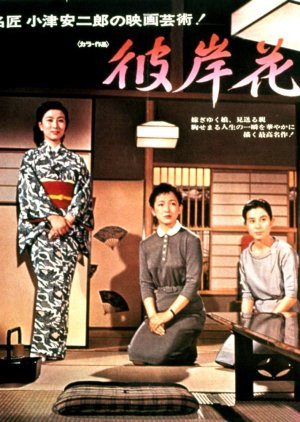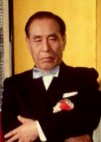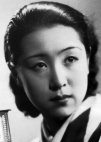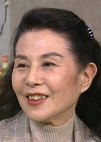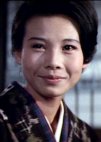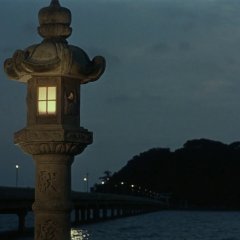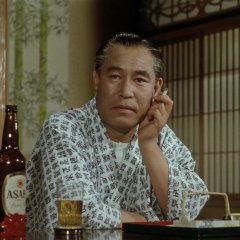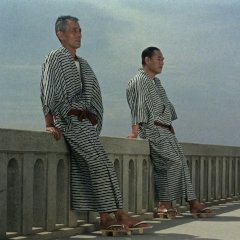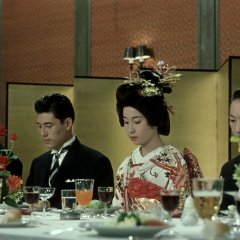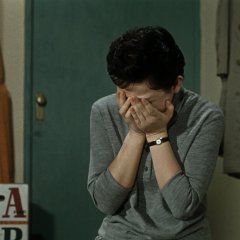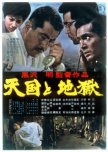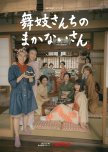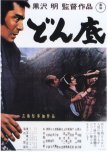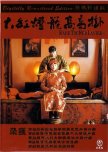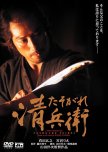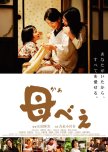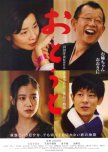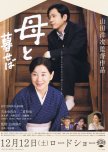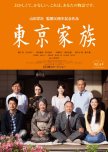- Français
- English
- magyar / magyar nyelv
- dansk
- Titre original: 彼岸花
- Aussi connu sous le nom de: Higanbana
- Scénariste et Réalisateur: Ozu Yasujiro
- Genres: Comédie
Distribution et équipes
- Saburi Shin Rôle principal
- Tanaka Kinuyo Rôle principal
- Arima InekoHirayama SetsuyoRôle Secondaire
- Kuga YoshikoMikami AyakoRôle Secondaire
- Sada KeijiTaniguchi MasahikoRôle Secondaire
- Kuwano MiyukiHirayama HisakoRôle Secondaire
Critiques

Cette critique peut contenir des spoilers
"Can't I find my own happiness?"
Ozu once again examined how a traditional family was forced to confront modern thinking in relation to love and marriage. He did so in a humorous manner without wandering into the dark side as he was capable of doing. In Equinox Flower a father with two independent minded daughters found himself suffering in a sea of his own inconsistencies from which only the women in his life could save him.The film opens at the train station with a storm warning. If only the men in this film knew the storm of independent thought that was going to upend their lives. Hirayama Wataru gives an emotional toast at a young couple's wedding. He praises them for marrying for love because his marriage had been a pragmatic arranged marriage. Later that week an old friend visits him and asks him to check on his daughter, Fumiko, who has left home. She didn't want an arranged marriage estranging their relationship. Wataru found her working at a bar and in love with a musician, but happy and healthy. No problem there. One of his daughter's friends, Yukiko, asks for advice dealing with her mother who is always trying to matchmake for her. He tells her not to be in a hurry to marry. "You may think marriage is golden, but it can end up being brass." When she dreams of a love match-no problem. When a young man name Taniguchi comes to his office asking permission to marry his oldest daughter, Setsuko---big problem. He was not consulted and didn't even know they were dating. Without realizing it he begins to set into motion the kind of estrangement his friend had with his daughter. The women around him begin to mobilize in their own subtle and not so subtle ways to help him change his mind and give his blessing to the young couple.
Setsuko and Yukiko pinky swore to help deal with their domineering parents and Yukiko laid the perfect trap for Wataru. Wataru's youngest daughter, Hisako, pushed for Setsuko to have a love match knowing it would be her turn next. Kiyoko, gently nudged her husband to do the right thing, always believing that he eventually would. With four women against him he never stood a chance no matter how controlling and cantankerous he could be.
I had to remind myself numerous times that this was 1958 when Wataru dropped his clothes on the floor for Kiyoko to deal with, told her to turn the radio off like you would a child, and went drinking or on reunion trips with his buddies. He also grounded Setsuko and told her to quit her job because he was angry with her. Ozu's wives always seem terribly confined to the house with no social life whatsoever except caring for their husbands. Wataru worked late and spent time afterwards with male friends. Kiyoko stayed in the house with only a maid for company. When Kiyoko yearned for the days during the war when the family huddled together in the bomb shelters because they were actually all together, it was sad indictment on her life.
Ozu put color to good use in his first film to use it. While much of the settings were beige and gray, most of the men dressed in gray suits as well, he displayed bright pops of color in red, green, and blue. The women, with the exception of Kiyoko, often wore bright colored kimonos. His teapot (red) had a couple of closeups and trains also figured into the story as they usually did. I have never grown tired of his meditative compositions and framing of shots. The colors he chose were as soothing as they were in black and white. The only drawback to his style, for me, was as ever, the face nearly straight onto the camera framing which was jarring during dialogues because the characters were looking at me and not the character they were conversing with, bouncing back and forth like a ping pong.
Papa Hirayama came across like a 1950's man, one who was used to getting his way in everything at home. What was different was that the women in his life called him on it. Yukiko complained in the same way about her overbearing single mother and Fumiko refused to go home because her father wanted everything his way. The old tradition of a parent determining who their child would marry was giving way to the young people wanting to marry for love. And while Wataru could appreciate that for everyone else's daughter, he had trouble letting go of control of his own. Fortunately for him, the women in his life banded together to show him his own hypocrisy. He also learned when a woman said "it's fine" that he should not assume he had won the argument. Wataru was right though, it takes a lot of work to turn brass into gold in a relationship.
9/9/23
Cet avis était-il utile?

Exploring the gap between Parent and Child
Equinox flower (1958) was Ozu's 48th film (of 53) and his first feature film in color. As with all Ozu films, Equinox Flower is a family drama.This film focuses on an upper middle class family in conflict; that is the daughter's decision to choose a marriage partner without consulting parents and a parent's view they should be involved in the decision. It might seem filmgoers would automatically side with the daughter in this story, but many will sympathize with the old-fashioned father to a certain extent. If this topic interests you, do watch the film and be aware of your perceptions, thoughts, feelings, and judgments.
One side note, is that the title, "Equinox flower", is also the common name of an Asian lily - Lycoris radiata; it is also called 'red spider lily', 'red magic lily', and 'corpse flower'. It is a beautiful red flower (look it up online!). This flower blooms in August-September, close to the Autumn Equinox. The flower has some cultural relevance to death. Consider what element(s) of the film may symbolically link to this flower. Does it represent the decay/death of a parent-child relationship when the child marries and becomes 'independent' from parent?
This film primarily explores the gap or 'conflicts' in perception that parents and children have of one another. The following 2 script selections represent that gap.
Says one Mother to another mother:
I'm doing all I can,
but Yukiko (the speaker's adult daughter) just keeps telling me
to leave her alone and not bother her.
Children are so ungrateful.
Our children are the same.
It must be the same everywhere.
Says one adult daughter to another adult daughter (--):
I envy you, Setsuko.
Your parents aren't like my mother.
They're so understanding.
--I wouldn't be so sure of that.
They're not like Mom at all.
She always goes on and on
and never gets to the point.
--She has an interesting way of talking.
Yeah, too interesting, if you ask me.
Setsuko, we should team up.
--What do you mean?
You help me
when my mother's being unreasonable,
and I'll do the same for you.
Cet avis était-il utile?
Recommandations
There have been no recommendations submitted. Be the first and add one.

